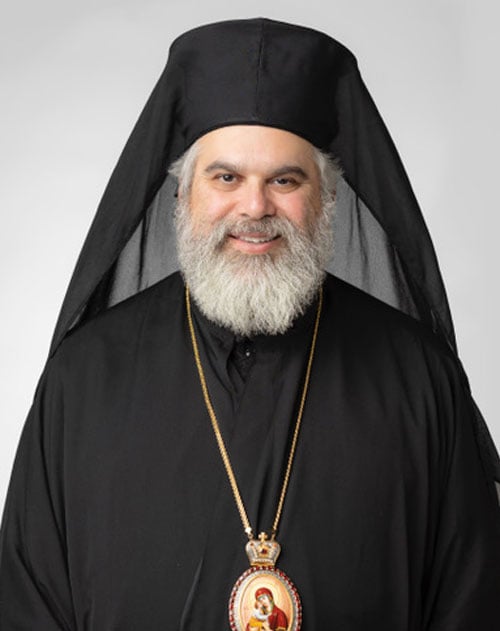
Calendar & Announcements
Fasting Recipes
Denver Metropolis News
Assembly of Bishops News
Archdiocese News
Ecumenical Patriarchate News
Gospel and Epistle Readings
Hymns of the Day
Saints and Feasts
Wisdom of the Fathers

General Information
Contact Information
Services Schedule
+++
All Services are
in
English
+++
Alternating Sundays:
9 AM Orthros Prayer Service &
10 AM Divine Liturgy Communion Service
—
10 AM Typica Service
—
The 10 AM Sunday services are followed by Coffee Hour and Fellowship.
Past Bulletins
- Publish Date:
- 2023-03-05
- Publish Date:
- 2023-02-19
- Publish Date:
- 2023-02-12
- Publish Date:
- 2023-02-05
- Publish Date:
- 2023-01-29
- Publish Date:
- 2023-01-22
Calendar & Announcements
REFLECTION ON THE BEGINNING OF LENT AND FASTING - MESSAGE FROM FR. NEKTARIOS
Let us set out with joy upon the season of the Fast, and prepare ourselves for spiritual combat. Let us purify our soul and cleanse our flesh; and as fast from food, let us abstain also from every passion. Rejoicing in the virtues of the Spirit may we persevere with love, and so be counted worthy to see the solemn Passion of Christ our God, and with spiritual gladness to behold His holy Pascha!
Beloved Brothers and Sisters in Christ,
~
Currently, the overall number of earthquake fatalities in both Turkey and Syria surpasses 50,000.
His Eminence Archbishop Elpidophoros of America announces the Greek Orthodox Archdiocese Earthquake Relief Fund, a fundraising effort by the Greek Orthodox Archdiocese of America to provide humanitarian aid to the victims of the recent earthquakes in Türkiye and Syria.
The Assembly of Bishops’ humanitarian relief agency, International Orthodox Christian Charities (IOCC) has launched a fundraising campaign in order to implement both emergency and long-term relief programs. IOCC’s efforts will directly assist and support the faithful of the region and their neighbors. Please consider supporting the campaign.
~
UPCOMING SERVICES
-
Sunday, February 26 - Forgiveness Sunday
9:00 am Orthros
10:00 am Divine Liturgy
6:00 pm - Forgiveness Vespers
NOTE: In addition to the Divine Liturgy on February 26, we will begin our journey into Great Lent together with the Vespers of Forgiveness on Sunday evening at 6:00 pm.
This is a solemn and prayerful service that helps us to begin the Lenten season in an appropriate way. Please join us for prayer and worship as we commit our thoughts, ways and time unto the Lord.
- Friday, March 3
6:30 pm - Salutations to the Theotokos
- Saturday, March 4 - Saturday of Souls
The sessions will be on Thursday at 7:00 pm via Zoom (see the link below).
All are welcome. Whether you are an experienced Orthodox, a serious enquirer, or a complete newbie, feel free to join us for discussion and learning.
Your host is Fr. Nektarios Morrow.
Zoom link: https://us02web.zoom.us/j/9299265692?pwd=cytWQUQ2Z1JrdnZ5czliMTR2dktoQT09
Meeting ID: 929 926 5692
Passcode: Grace22
Previous classes are archived on YouTube at https://www.youtube.com/channel/UC7ronGHeNPzEgi9mDcF0Y2A/streams
Questions? Email Fr. Nektarios
~
REPOSE OF FATHER JIM HADEMENOS - MEMORIAL FUND
Please continue to pray for Presvytera Dena and the family of a beloved priest and shepherd of Assumption Church, Fr. Jim.
In following the request of the family of Fr. Jim, the Parish has established a Memorial Fund. Please designate your gift for the Memorial Fund if you would like to make a donation.
May the memory of Fr. Jim be eternal.
~
CARING MEALS MINISTRY
If you know someone who needs meals due to illness, birth, etc., please see Kathy Baughman or Noelle Bartl. Thank you to everyone who volunteers for this ministry. You are being the hands of Christ!
~
BAKE SALE FUNDRAISER FOR CHURCH
We are still accepting orders for Greek Pastries. All proceeds go to supprt the operating costs of our parish. Please contact Wilma Dunias, a member of our parish, at baklavabywilma@live.com or 720-989-7928.
~
HELP FOR THE GARCIA FAMILY
~
COFFEE HOUR
We have open slots on the sign up sheet for Coffee Hour, which can be found on the refrigerator in the church kitchen. Can you help host? It's okay to bring something simple, or even just one dish. Encourage others to sign up with you as co-hosts. "Many hands make the burden light." Thank you for your help!
~
Check out the rest of the bulletin! See below for news from the world of Orthodoxy, online concerts and lecture series, and more.
~
SPECIAL OCCASIONS FOR FEBRUARY
Birthdays: Joe Garcia, Joanna Kalaitzes, Theresa Alexander
Anniversaries: George & Yolanda Kalaitzes, Gary & Charis Worden, Fr. Mark Lichtenstein and Presbytera Suzanne
Namedays:
-
2/13 Jason Rosenstrom (St. Martinian)
-
2/17 Chloe Choate (St. Chloe)
Memorials: Fr. James Hademenos
SPECIAL OCCASIONS FOR MARCH
Birthdays: Seraphina Zamora, Olivia Choate, Sharmaine Zamora, Anna Baker, Wilma Dunias, Cia Alexander, Jared Crusberg, Julietta Garcia
Anniversaries: Anniversary of Ordination to the Holy Priesthood Fr. Mark Lichtenstein (on the Feast of the Finding of the Cross by St. Helen), Alan & Kathleen Baughman
Namedays:
-
3/2 Sharmaine Zamora
-
3/11 Theresa Alexander (St. Theodora)
-
3/14 Matthew Johnson (Benedict of Nursia)
~
AFTER CHURCH
Please join us for refreshments in the Social Hall.
** As always, see the parish website for any changes and updates. **
Fasting Recipes
JOYFUL FASTING
When you hear that Lent is coming, do you close your eyes and groan? What if I said there is a secret to not starving when you fast — would that help you fast more cheerfully?
Well, there is. Fasting is about more than just food, of course, but let's face it: It's hard to do those other things when we are low on energy due to not getting good nutrition.
So here it is: The secret to fasting without starving is eating complementary protiens, such as beans + rice.
Proteins are made of amino acids. Meats, seafood, and dairy have all the amino acids our bodies need, so they are called "complete proteins."
Most fasting foods, however, rely on "partial proteins." In a beans-and-rice dish, for example, beans have some of the amino acids our bodies need daily...and rice has the others. They are complementary to each other, meaning that they complete each other by being together.
When we pair partial proteins together, we can create a "complete protein." Instead of feeling like we are starving during Lent, we can feel light and satisfied. We just need to know there are two categories of partial proteins, and we need one from each category to create a complete, satisfying protein.
Category 1: Beans*, seeds, peas, nuts**
Category 2: Rice, potatoes, corn, grains, bread, pasta, tortillas
*See below for tips on how to avoid gassiness from beans.
**It is not recommended to bring nut dishes to public events.
Did you know that fasting foods are supposed to be simple to prepare? This is so we can have more time to spend on praying, reading our Bibles, going to weekday services, studying about saints and Church history, giving alms, and doing good deeds for others, as caring Christ-followers should.
These physical actions of devotion, alms-giving, and doing good deeds are part of fasting. Why? Because we are fasting from some of our worldly activities (such as more-elaborate meal preparation) and devoting our time and attention to Christ.
It's not that elaborate meal preparation is unholy — not at all! Fancier cooking is simply an activity we give up on Wednesdays and Fridays, and all during Lent, so we can devote more of our time and energy to Christ.
Even so, fasting food can be tasty! Here are two examples:
- Try this Creamy Pea Pasta dish. The creamy green sauce is made using a blender to puree some of the peas, shallots (onion), and garlic. Frozen petite peas work very well in this sauce, and fresh garden mint and lemon make a delicious, aromatic flavor.
- This vegan Louisiana Red Beans and Rice dish uses smoked paprika to give it a deep, delicious taste. Serve it with a crunchy salad or stewed greens on the side.
Tips:
Worried about gas from beans? Watch this video about proper preparation of beans to make them more digestible.
If you prefer canned beans, we recommend using Eden Organic canned beans. They are prepared with overnight soaking to avoid gassiness.
Actually, soaking is good to do for more than just beans: Soaking any partial protien before cooking improves its digestibility. In other words, soaking before cooking makes it easier for your body to break down the food, and lets you absorb more nutrients from it. For more on this, see the article, "Living with Phytic Acid."
~
COOKBOOK RECOMMENDATION
Looking for a fasting cookbook that deals with modern diets like paleo, gluten-free, and nut-free? That isn't ethnic?
- Try Fasting as a Family by Melissa Naasko, blogger and mother of 11. Available from Ancient Faith and Amazon.
- Melissa also has a useful Facebook page @FastingFamily.
Article on "Joyful Fasting" © 2022 Presvytera Suzanne Thorpe Lichtenstein, used by permission
Denver Metropolis News
Archdiocese News
SATURDAY OF SOULS (Memory of the Holy Ascetics) Christ Offers Himself
02/24/2023
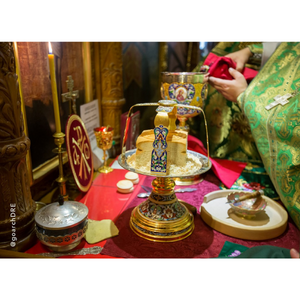 Even before Christianity was established, it was common practice for various cultures in the Mediterranean world to hold commemorations for the dead, where sacrifices were offered, family get-togethers were organized, and petitions in favor of the spirits of those who had perished were made.
Even before Christianity was established, it was common practice for various cultures in the Mediterranean world to hold commemorations for the dead, where sacrifices were offered, family get-togethers were organized, and petitions in favor of the spirits of those who had perished were made.
Archdiocesan Greek Language Programs Receive Teq Equipment to Support Student Learning
02/23/2023
 Nearly 100 parishes now have access to high-tech learning tools for their students. The Department of Greek Education, with the generosity of the Stavros Niarchos Foundation, for a second year, was able to purchase Interactive Panels, SMART TVs, and Chromebooks for parishes that teach the Greek language.
Nearly 100 parishes now have access to high-tech learning tools for their students. The Department of Greek Education, with the generosity of the Stavros Niarchos Foundation, for a second year, was able to purchase Interactive Panels, SMART TVs, and Chromebooks for parishes that teach the Greek language.
Fr. John Chryssavgis to Speak On Ecumenical Patriarch Bartholomew’s Vision of Ecumenism at Catholic University of America
02/23/2023
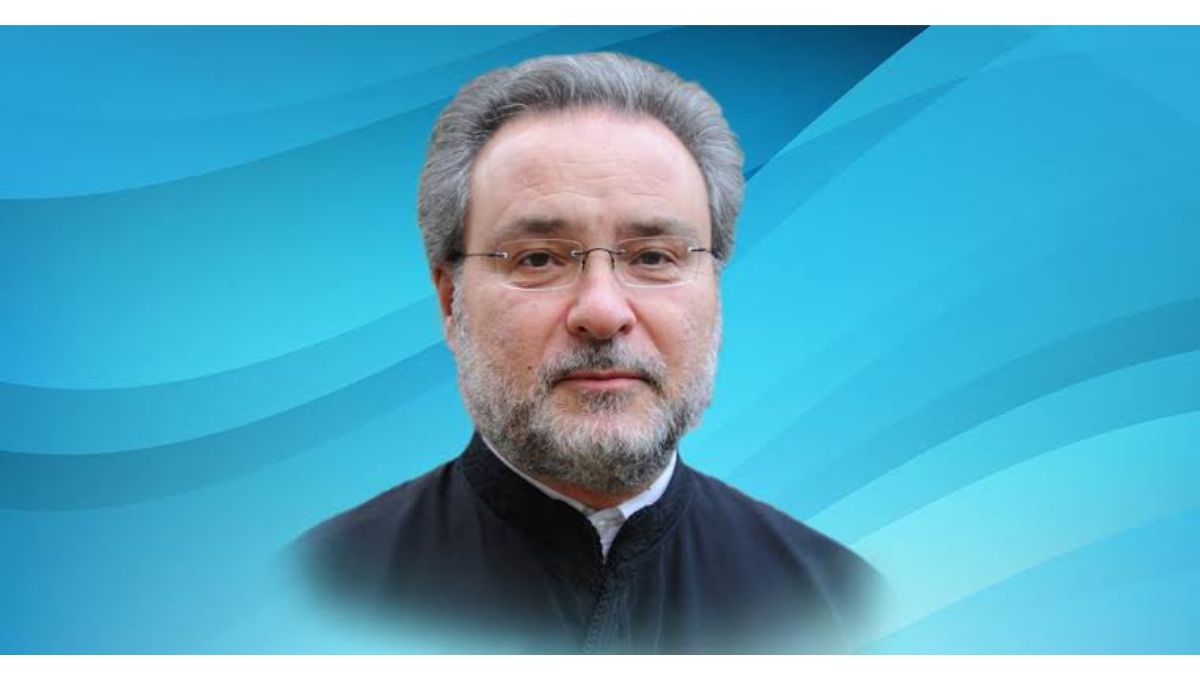 Father John Chryssavgis, the internationally renowned theologian who serves as Theological Advisor to His All-Holiness Ecumenical Patriarch Bartholomew, will offer the annual Washington Theological Consortium Lecture on Thursday, February 23, 2023, at Catholic University of America in Washington, D.C.
Father John Chryssavgis, the internationally renowned theologian who serves as Theological Advisor to His All-Holiness Ecumenical Patriarch Bartholomew, will offer the annual Washington Theological Consortium Lecture on Thursday, February 23, 2023, at Catholic University of America in Washington, D.C.
Watch Now: Vision for a New GOA Charter
02/22/2023
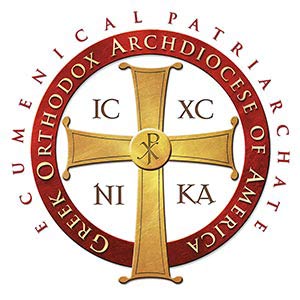 What is the vision for the new GOA charter? During the Leadership 100 Conference in Phoenix, Arizona from Feb. 2 - Feb. 5, 2023, His Eminence Archbishop Elpidophoros of America had the opportunity to address this subject, which remains one of our church's greatest priorities.
What is the vision for the new GOA charter? During the Leadership 100 Conference in Phoenix, Arizona from Feb. 2 - Feb. 5, 2023, His Eminence Archbishop Elpidophoros of America had the opportunity to address this subject, which remains one of our church's greatest priorities.
Sunday Sermon Series - Forgiveness Sunday
02/22/2023
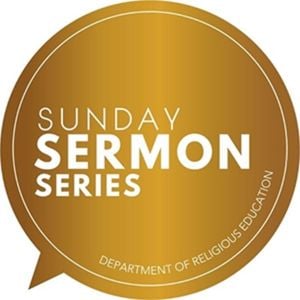 This week, find insights about the upcoming Gospel reading, where we learn about Christ’s teachings on forgiveness, fasting, and trust. Forgiveness Sunday is the last day before we begin our journey through Great and Holy Lent. How can we best prepare for Lent? And reconnect with Christ during this holy period?
This week, find insights about the upcoming Gospel reading, where we learn about Christ’s teachings on forgiveness, fasting, and trust. Forgiveness Sunday is the last day before we begin our journey through Great and Holy Lent. How can we best prepare for Lent? And reconnect with Christ during this holy period?
New Children's Book in Greek Available on Orthodox Marketplace
02/21/2023
 The Greek Orthodox Archdiocese Department of Greek Education is delighted to announce the publication of "Oi Rizes Mou" now available on Orthodox Marketplace.
The Greek Orthodox Archdiocese Department of Greek Education is delighted to announce the publication of "Oi Rizes Mou" now available on Orthodox Marketplace.
Webinar Hosted by Internet Minstries
02/20/2023
 All parishes are invited to attend a free webinar - "Using TechSoup to Supercharge Your Parish" - hosted by the Department of Internet Ministries on Wednesday, February 22 at 3:30 PM ET.
All parishes are invited to attend a free webinar - "Using TechSoup to Supercharge Your Parish" - hosted by the Department of Internet Ministries on Wednesday, February 22 at 3:30 PM ET.
Lenten Lectures at Nassau County, New York
02/20/2023
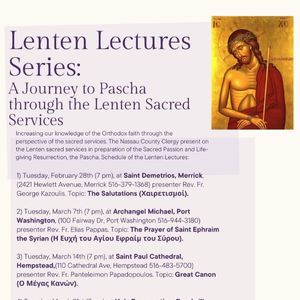 The Nassau County Vicariate of the Direct Archdiocesan District offers a series of lectures dedicated to the theme “A Journey to Pascha through the Lenten Sacred Services.”
The Nassau County Vicariate of the Direct Archdiocesan District offers a series of lectures dedicated to the theme “A Journey to Pascha through the Lenten Sacred Services.”
Ionian Village 2023 Spots Filling Up!
02/16/2023
 The Office of Ionian Village announces that Ionian Village, the international camping ministry of the Greek Orthodox Archdiocese of America is rapidly filling for summer 2023! Camp is open to young people who are currently in the 9th grade through those who will complete the 12th grade in the spring of 2023.
The Office of Ionian Village announces that Ionian Village, the international camping ministry of the Greek Orthodox Archdiocese of America is rapidly filling for summer 2023! Camp is open to young people who are currently in the 9th grade through those who will complete the 12th grade in the spring of 2023.
A Book Just in Time for Forgiveness Sunday Available on Orthodox Marketplace
02/15/2023
 The book Love Your Enemies explains how Christ has revealed a way to obtain the absolution of our sins, no matter how great the offense: by forgiving with all our heart those who have wronged us and loving them without regard to what they have done.
The book Love Your Enemies explains how Christ has revealed a way to obtain the absolution of our sins, no matter how great the offense: by forgiving with all our heart those who have wronged us and loving them without regard to what they have done.
Ecumenical Patriarchate News
Catechetical Homily of His All-Holiness Ecumenical Patriarch Bartholomew At the Opening of Holy and Great
02/24/2023
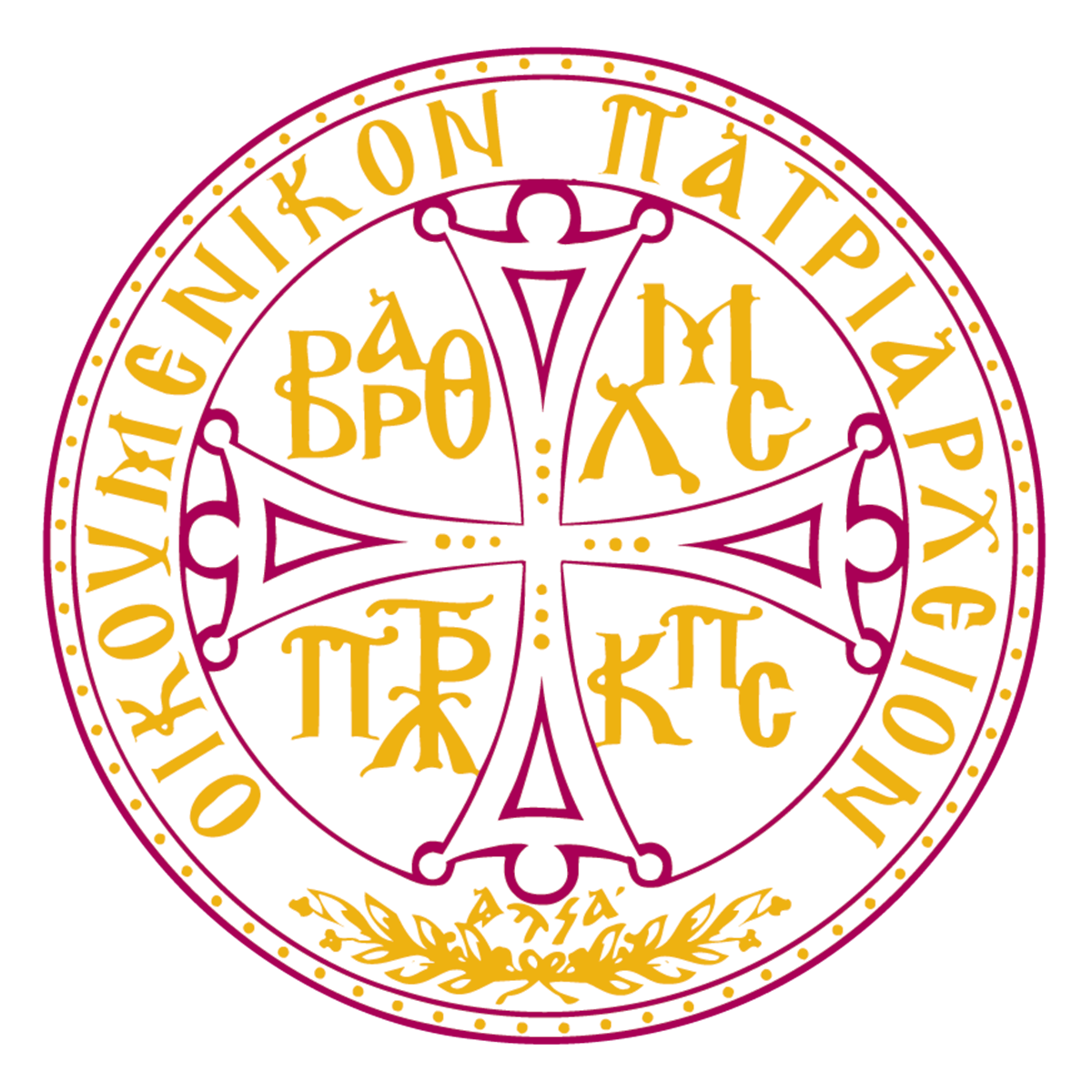 Most honorable brother Hierarchs and blessed children in the Lord,
By the goodwill and grace of the all-merciful and all-benevolent God, already living in the blessed and reverent period of the Triodion, tomorrow we enter Holy and Great Lent, the arena of fasting and “venerable abstinence” that eliminate the passions, during which the depth and wealth of our Orthodox Tradition and the vigilant care of the Church for the spiritual progress of its children are revealed.
Most honorable brother Hierarchs and blessed children in the Lord,
By the goodwill and grace of the all-merciful and all-benevolent God, already living in the blessed and reverent period of the Triodion, tomorrow we enter Holy and Great Lent, the arena of fasting and “venerable abstinence” that eliminate the passions, during which the depth and wealth of our Orthodox Tradition and the vigilant care of the Church for the spiritual progress of its children are revealed.
Gospel and Epistle Readings
Matins Gospel Reading
Fourth Orthros Gospel
The Reading is from Luke 24:1-12
On the first day of the week at early dawn, the women went to the tomb, taking spices, which they had prepared. And they found the stone rolled away from the tomb, but when they went in they did not find the body of the Lord Jesus. While they were perplexed about this, behold, two men stood by them in dazzling apparel; and as they were frightened and bowed their faces to the ground, the men said to them, "Why do you seek the living among the dead? He is not here, but has risen. Remember how He told you, while He was still in Galilee, that the Son of Man must be delivered into the hands of sinful men, and be crucified, and on the third day rise." And they remembered His words and returning from the tomb they told all this to the eleven and to all the rest. Now it was Mary Magdalene and Joanna and Mary the mother of James and the other women with them who told this to the Apostles; but these words seemed to them an idle tale, and they did not believe them. But Peter rose and ran to the tomb; stooping and looking in, he saw the linen cloths by themselves; and he went home wondering at what had happened.
Epistle Reading
Prokeimenon. 8th Tone. Psalm 75.11,1.
Make your vows to the Lord our God and perform them.
Verse: God is known in Judah; his name is great in Israel.
The reading is from St. Paul's Letter to the Romans 13:11-14; 14:1-4.
Brethren, salvation is nearer to us now than when we first believed; the night is far gone, the day is at hand. Let us then cast off the works of darkness and put on the armor of light; let us conduct ourselves becomingly as in the day, not in reveling and drunkenness, not in debauchery and licentiousness, not in quarreling and jealousy. But put on the Lord Jesus Christ, and make no provision for the flesh, to gratify its desires.
As for the man who is weak in faith, welcome him, but not for disputes over opinions. One believes he may eat anything, while the weak man eats only vegetables. Let not him who eats despise him who abstains, and let not him who abstains pass judgment on him who eats; for God has welcomed him. Who are you to pass judgment on the servant of another? It is before his own master that he stands or falls. And he will be upheld, for God is able to make him stand.
Gospel Reading
Forgiveness Sunday
The Reading is from Matthew 6:14-21
The Lord said, "If you forgive men their trespasses, your heavenly Father also will forgive you; but if you do not forgive men their trespasses, neither will your Father forgive your trespasses.
"And when you fast, do not look dismal, like the hypocrites, for they disfigure their faces that their fasting may be seen by men. Truly, I say to you, they have received their reward. But when you fast, anoint your head and wash your face, that your fasting may not be seen by men but by your Father who is in secret; and your Father who sees in secret will reward you.
"Do not lay up for yourselves treasures on earth, where moth and rust consume and where thieves break in and steal, but lay up for yourselves treasures in heaven, where neither moth nor rust consumes and where thieves do not break in and steal. For where your treasure is, there will your heart be also."
Hymns of the Day
Resurrectional Apolytikion in the 4th Tone
Seasonal Kontakion in the 6th Tone
Saints and Feasts
Forgiveness Sunday
The Holy Fathers have appointed the commemoration of Adam's exile from the Paradise of delight here, on the eve of the holy Forty-day Fast, demonstrating to us not by simple words, but by actual deeds, how beneficial fasting is for man, and how harmful and destructive are insatiety and the transgressing of the divine commandments. For the first commandment that God gave to man was that of fasting, which the first-fashioned received but did not keep; and not only did they not become gods, as they had imagined, but they lost even that blessed life which they had, and they fell into corruption and death, and transmitted these and innumerable other evils to all of mankind. The God-bearing Fathers set these things before us today, that by bringing to mind what we have fallen from, and what we have suffered because of the insatiety and disobedience of the first-fashioned, we might be diligent to return again to that ancient bliss and glory by means of fasting and obedience to all the divine commands. Taking occasion from today's Gospel (Matt. 6:14-21) to begin the Fast unencumbered by enmity, we also ask forgiveness this day, first from God, then from one another and all creation.
Porphyrius, Bishop of Gaza
Saint Porphyrius had Thessalonica as his homeland. He became a monk in Scete of Egypt, where he lived for five years. He went on pilgrimage to Jerusalem, after which he spent five years in much affliction in a cave near the Jordan. Stricken with a disease of the liver, he departed to Jerusalem, where he was ordained presbyter and appointed Keeper of the Cross at the age of 45. Three years later he was made Bishop of Gaza. He suffered much from the rulers and pagans of Gaza; but with the friendship of Saint John Chrysostom, and the patronage of the Empress Eudoxia, he razed the temple of the idol Marnas in Gaza and built a great church to the glory of God. He reposed in 450.
The Holy Great Martyr Photine, the Samaritan Women
Saint Photini lived in 1st century Palestine and was the woman that Christ met at Jacob's Well in Samaria as recorded in the Gospel according to John (4:4-26). After her encounter with Christ, she and her whole family were baptized by the Apostles and became evangelists of the early Church. Photini and her children eventually were summoned before the emperor Nero and instructed to renounce their faith in Christ. They refused to do so, accepting rather to suffer various tortures. After many efforts to force her to surrender to idolatry, the emperor ordered that she be thrown down a well. Photini gave up her life in the year 66.
St. Photini is commemorated on three occasions during the year: February 26 (Greek tradition), March 20 (Slavic tradition), and the Sunday of the Samaritan Woman on the 5th Sunday of Pascha.
John Claphas the new Martyr
Gelasios the Actor and Martyr of Heliopolis
Procopius the Confessor of Decapolis
Saints Procopius and Basil, fellow ascetics, lived about the middle of the eighth century, during the reign of Leo the Isaurian (717-741), from whom they suffered many things for the sake of the veneration of the holy icons. They ended their lives in the ascetical discipline.
Stephen the Monk
Nesios the Martyr
First Monday of Lent - Clean Monday
Raphael of Brooklyn
Saint Raphael Hawaweeny was born on November 8th, 1860 A.D., in Damascus, Syria, to pious Christian parents. He studied Arabic grammar and mathematics at the Antiochian Patriarchate parochial school where he was tonsured a reader in 1874. His strong academics served him well throughout his life, providing for him numerous opportunities to succeed and grow. He accepted a position in 1877 as an assistant teacher of Arabic and Turkish, which became full time in 1879. In 1879 he was tonsured a monk while working with Patriarch Hierotheos at the patriarchate, traveling with him on pastoral visits and serving as his personal assistant.
Longing to continue his theological studies, Raphael petitioned the Patriarch for permission to study at Halki Theological School, which was the only option for students of the Antiochian Patriarchate as the Balamand Seminary in Lebanon had been closed since 1840. After much persistence, Raphael received the blessing of the Patriarch and enrolled in Halki Seminary where he was ordained a deacon in 1885. After completing his degree at Halki, the young Deacon Raphael studied at the Kiev Theological Academy, working as a liaison between the Moscow and Antiochian patriarchates. Deacon Raphael was ordained to the holy priesthood in 1889 while in Kiev, continuing to serve that community for many years.
The opening of the Suez Canal in 1869 led to the subsequent collapse of the silk industry in the Middle East, causing many Syrians and others to immigrate to the United States. These new citizens desired to have their religion present in their new homeland and sent letters to their mother churches for pastoral help. A few priests were sent, but none lasted, and so the people asked for Father Raphael Hawaweeny to come to America and serve. Both the Antiochian and Moscow Patriarchs agreed to this idea, and Father Raphael left for America where the people greeted him with great love. Father Raphael then spent many years serving the Syrians in Brooklyn, New York, but he desired to scan the continent for Syrians and other Orthodox Christians who were without spiritual leadership. He traveled by train and carriage across the nation, finding Orthodox Christians, recording their location, and performing liturgies, baptisms, and weddings. Upon his return to Brooklyn, Father Raphael worked to find clergy to send to these dispersed communities, giving them a full time pastor to minister to their needs.
In 1909, by the hands of Bishops Tikhon and Innocent of the Moscow Patriarchate, he was the first bishop consecrated in the New World. The now Bishop Raphael continued his ministry to the Christians throughout America. Bishop Raphael worked tirelessly in Brooklyn to mediate disputes between the Orthodox Christians from Syria and Maronite Catholic Christians who often fought violently with one another. Despite numerous outbursts and setbacks, Bishop Raphael continued his ministry serving the Orthodox throughout his vast diocese. One such incident was when an influential leader of the Maronite group was killed and many people accused Bishop Raphael of ordering his murder. This led to many people attempting to harm the bishop, but he endured it all willingly. He was arrested under attempted murder charges, but was eventually cleared and let go after much time and money was spent in his defense.
Throughout his time in North America, Bishop Raphael founded 36 parishes to bring the Church to the faithful who were without a priest to guide them. Bishop Raphael truly lived out Gospel in all aspects of his life, striving tirelessly for the people in his care, even to the point of sacrificing his own physical health in order to maintain the spiritual health of his people. Bishop Raphael died on February 27th, 1915, at his home in Brooklyn. His funeral was attended by hundreds of people, including clergy from all ethnic backgrounds, illustrating his love for all of the people of God regardless of where they came from. The sacred relics of Saint Raphael, “the good shepherd of the lost sheep in North America,” were first interred in a crypt beneath the holy table at his Saint Nicholas Cathedral in Brooklyn on March 7th, 1915, before being moved to the Syrian section of Mount Olivet Cemetery in Brooklyn on April 2nd, 1922. They were finally translated to the Holy Resurrection Cemetery at the Antiochian Village near Ligonier, Pennsylvania, on August 15th, 1988. His sanctity was officially proclaimed by the Holy Synod of the Orthodox Church in America on March 29th, 2000, and his glorification was celebrated on May 29th of that year at the Monastery of Saint Tikhon in Pennsylvania.
Righteous John Cassian the Confessor
Note: If it is not a leap year the hymns of Saint John are transferred to the 28th.
This Saint was born about the year 350, and was, according to some, from Rome, according to others, from Dacia Pontica (Dobrogea in present-day Romania). He was a learned man who had first served in the military. Later, he forsook this life and became a monk in Bethlehem with his friend and fellow-ascetic, Germanus of Dacia Pontica, whose memory is also celebrated today. Hearing the fame of the great Fathers of Scete, they went to Egypt about the year 390; their meetings with the famous monks of Scete are recorded in Saint John's Conferences. In the year 403 they went to Constantinople, where Cassian was ordained deacon by Saint John Chrysostom; after the exile of Saint Chrysostom, Saints Cassian and Germanus went to Rome with letters to Pope Innocent I in defence of the exiled Archbishop of Constantinople. There Saint Cassian was ordained priest, after which he went to Marseilles, where he established the famous monastery of Saint Victor. He reposed in peace about the year 433.
The last of his writings was On the Incarnation of the Lord, Against Nestorius, written in 430 at the request of Leo, the Archdeacon of Pope Celestine. In this work he was the first to show the spiritual kinship between Pelagianism, which taught that Christ was a mere man who without the help of God had avoided sin, and that it was possible for man to overcome sin by his own efforts; and Nestorianism, which taught that Christ was a mere man used as an instrument by the Son of God, but was not God become man; and indeed, when Nestorius first became Patriarch of Constantinople in 428, he made much show of persecuting the heretics, with the exception only of the Pelagians, whom he received into communion and interceded for them to the Emperor and to Pope Celestine.
The error opposed to Pelagianism but equally ruinous was Augustine's teaching that after the fall, man was so corrupt that he could do nothing for his own salvation, and that God simply predestined some men to salvation and others to damnation. Saint John Cassian refuted this blasphemy in the thirteenth of his Conferences, with Abbot Chairemon, which eloquently sets forth, at length and with many citations from the Holy Scriptures, the Orthodox teaching of the balance between the grace of God on one hand, and man's efforts on the other, necessary for our salvation.
Saint Benedict of Nursia, in Chapter 73 of his Rule, ranks Saint Cassian's Institutes and Conferences first among the writings of the monastic fathers, and commands that they be read in his monasteries; indeed, the Rule of Saint Benedict is greatly indebted to the Institutes of Saint John Cassian. Saint John Climacus also praises him highly in section 105 of Step 4 of the Ladder of Divine Ascent, on Obedience.
Basil the Confessor
Saints Procopius and Basil, fellow ascetics, lived about the middle of the eighth century, during the reign of Leo the Isaurian (717-741), from whom they suffered many things for the sake of the veneration of the holy icons. They ended their lives in the ascetical discipline.
Eudokia the Martyr of Heliopolis
This Saint, who was from Heliopolis of Phoenicia (Baalbek in present-day Lebanon), was an idolater and led a licentious life. Being beautiful beyond telling, she had many lovers, and had acquired great riches. Yet brought to repentance by a monk named Germanus, and baptized by Bishop Theodotus, she distributed to the poor all her ill-gotten gains, and entered a convent, giving herself up completely to the life of asceticism. Her former lovers, enraged at her conversion, her refusal to return to her old ways, and the withering away of her beauty through the severe mortifications she practiced, betrayed her as a Christian to Vincent the Governor, and she was beheaded, according to some, under Trajan, who reigned from 98 to 117, according to others, under Hadrian, who reigned from 117 to 138.
Hesychios the Martyr
Holy martyr Hesychius lived during the reign of king Maximian in 302. He was the first and the leader in the royal palace and the Senate, because he was magistrianus by office. When Maximian ordered that all Christians who were royal soldiers ought to be deprived of their belts (which were a sign of their royal merit) and live as civilians and without honour, many Christians preferred to live without any outward honour due to this illegal order than to be honoured and lose their soul. St. Hesychius was numbered with these Christians as well. When the king heard this, he ordered that the saint ought to be stripped of the expensive clothes, which he used to wear, and be dressed with a shabby mantle without sleeves woven from hair and to be as disgraced and disdained as to consort with women.
When this had been carried out, the king invited him and asked him: "Aren't you ashamed, Hesychius, that you lost the honour and office of magistrianus and that you have been debased to this kind of life? Or maybe you don't know that the Christians, whose way of life you preferred, have no power to restore you to your previous great honour and office?" The saint replied: "Your honour, o king, is temporary but the honour and glory which Christ gives is eternal and without end." Because of these words the king got angry and ordered his men to tie a great millstone around the saint's neck and then to throw him in the middle of river Orontus, which lies in Coele Syria and which is commonly called Oronge. Thus, the blessed man received the crown of martyrdom from the Lord.
Our Holy Father Nicholas Planas
Saint Nicholas Planas was born in 1851 A.D. on the island of Naxos in Greece. He was married as a teenager and soon after ordained to the diaconate and then the priesthood. His wife reposed soon after and so he assumed the burden of being a widowed father and a parish priest. He was known for his zeal in serving the liturgy, especially his habit of serving the Divine Liturgy every day for 50 years. Many altar boys would see him radiating light or raised off the ground while serving the liturgy. Being so revered by his parishioners, he became known as “Papa,” which is an affectionate term for a parish priest. Papa Nicholas reposed in 1932 and was formally canonized as a saint in 1992.
Our Holy Father Nicholas Planas
Saint Nicholas Planas was born in 1851 A.D. on the island of Naxos in Greece. He was married as a teenager and soon after ordained to the diaconate and then the priesthood. His wife reposed soon after and so he assumed the burden of being a widowed father and a parish priest. He was known for his zeal in serving the liturgy, especially his habit of serving the Divine Liturgy every day for 50 years. Many altar boys would see him radiating light or raised off the ground while serving the liturgy. Being so revered by his parishioners, he became known as “Papa,” which is an affectionate term for a parish priest. Papa Nicholas reposed in 1932 and was formally canonized as a saint in 1992.
Theodoretos the Holy Martyr of Antioch
Eutropios, Kleonikos, Vasiliskos, Zenos, & Zoilis the Martyrs
The Martyrs, who were from Amasia, were fellow soldiers and kinsmen of Saint Theodore the Tyro (see Feb. 17). They were betrayed to the Governor Asclepiodotus as Christians, during the reign of Diocletian (284-305). After many torments, Eutropius and Cleonicus were crucified; Basiliscus was not slain together with them, but was shut up in prison, in the hope that with time he might change his mind and sacrifice to the idols. He was beheaded on May 22; see also the account on that day.
Gerasimos the Righteous of Jordan
This Saint, who was from Lycia in Asia Minor, lived there for many years as a hermit, and then went to Palestine. There he built the great Lavra by the Jordan River, where a lion served him with great obedience and devotion. One day the lion came looking for Gerasimus that he might feed him, but his disciples took the lion to the place where they had buried the Saint shortly before. The lion fell at the Saint's grave and, after roaring with grief, died at that very place. Saint Gerasimus reposed in 475.
Daniel, Prince of Moscow
First Saturday of Lent: The Commemoration of the Miracle of Kollyva wrought by Saint Theodore the Tyro
Julian the Apostate, knowing that the Christians purify themselves by fasting most of all during the first week of the Fast -- which is why we call it Clean Week -- planned to defile them especially at that time. Therefore he secretly commanded that during those days the markets be filled with foods that had been defiled with the blood of animals offered in sacrifice to idols. But by divine command the Martyr Theodore (see Feb. 17) appeared during sleep to Eudoxius, then Archbishop of Constantinople. The Saint revealed to him the tyrant's plan, then told him to call the faithful together immediately on Monday morning and prevent them from purchasing those foods, but rather to make kollyva to supply their needs. The bishop asked what kollyva might be, and the Saint answered, "Kollyva is what we call boiled wheat in Euchaita." Thus, the purpose of the Apostate was brought to nought, and the pious people who were preserved undefiled for the whole of Clean Week, rendered thanks to the Martyr on this Saturday, and celebrated his commemoration with kollyva. These things took place in 362. Wherefore, the Church keeps this commemoration each year to the glory of God and the honour of the Martyr.
Konon the Gardener
This saint lived during the reign of emperor Decius in 251. He came from the town of Nazareth. He left his hometown and went to the city of Mandron, in the province of Pamphylia. There he stayed at a place called Karmela or Karmena cultivating a garden which he used to water and plant with various vegetables. From this garden he obtained what is necessary for life. He had such an upright and simple mind that, when he met those who wished to arrest him and saw that they greeted him, he also greeted in return from the bottom of his soul and heart. When they told him that governor Publius called the saint to go to him, the saint answered with simplicity: "What does the governor need me, since I am a Christian? Let him call those who think the way he does and have the same religion with him." So, the blessed man was tied and brought to the governor, who tried to move him to sacrifice to the idols. But the saint sighed from the bottom of his heart, cursed the tyrant and confirmed his faith in Christ with his confession, saying that it is not possible to be moved from it even though he might be tortured cruelly. So, for this reason they nailed his feet and made the saint run in front of the governor's coach. But the saint fainted in the street. Having fallen on his knees, he prayed and, thus, he commended his holy soul to the hands of God.
Mark the Ascetic
Saint Mark the Ascetic lived in the fifth century and according to Nicephorus Callistus was a disciple of Saint John Chrysostom's. Besides his blameless life of asceticism, Saint Mark was distinguished for his writings, some of which are preserved in Volume One of the Philokalia. His writings were held in such great esteem that in old times there was a saying, "Sell all that thou hast, and buy Mark."
Righteous Father Mark of Athens
Of our righteous Fathers commemorated today, Saint Mark of Athens lived in the fourth century. Born in Athens of pagan parents, he believed in Christ, was baptized, and forsook the world, living the eremitical life in extreme privation in the deep wilderness beyond Egypt. His life is recounted by the monk Serapion, who found Mark in deep old age and about to depart this lfe, not having seen a man for ninety-five years. Serapion gave him burial after his blessed repose, even as Paphnutius had done for Saint Onuphrius (see June 12).
John the Bulgarian
Sunday of Orthodoxy
For more than one hundred years the Church of Christ was troubled by the persecution of the Iconoclasts of evil belief, beginning in the reign of Leo the Isaurian (717-741) and ending in the reign of Theophilus (829-842). After Theophilus's death, his widow the Empress Theodora (celebrated Feb. 11), together with the Patriarch Methodius (June 14), established Orthodoxy anew. This ever-memorable Queen venerated the icon of the Mother of God in the presence of the Patriarch Methodius and the other confessors and righteous men, and openly cried out these holy words: "If anyone does not offer relative worship to the holy icons, not adoring them as though they were gods, but venerating them out of love as images of the archetype, let him be anathema." Then with common prayer and fasting during the whole first week of the Forty-day Fast, she asked God's forgiveness for her husband. After this, on the first Sunday of the Fast, she and her son, Michael the Emperor, made a procession with all the clergy and people and restored the holy icons, and again adorned the Church of Christ with them. This is the holy deed that all we the Orthodox commemorate today, and we call this radiant and venerable day the Sunday of Orthodoxy, that is, the triumph of true doctrine over heresy.
